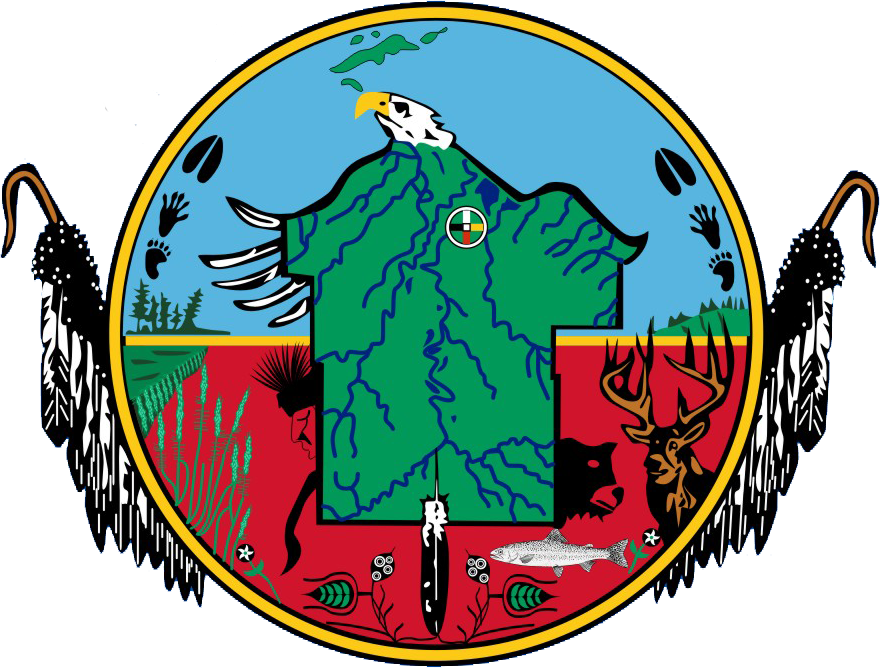Tribal Statistics
There are currently 6,945 Bad River tribal members
The Bad River Reservation totals 124,655 acres
- 57,884 (46.4%) acres are tribally owned
- 34,051 (27.3) acres are considered fee land
- 26,813 (21.5%) acres are considered other fee land
- 2,970 (2.3%) are considered municipal
Tribal Government
The Bad River tribe is governed by a seven-member Council
- The Council meets monthly
- Decision-making is by majority rule and the chairman only votes in the event of a tie
- Elections are held annually with four positions up for election one year and three the following year
Brief History
The Bad River Reservation in northwestern Wisconsin is the largest Chippewa reservation in the state. The reservation boundaries include lands in Ashland and Iron counties, 17 miles of Lake Superior shoreline and over 100 miles of rivers and streams. The Bad River Reservation is 124,655 acres of primarily undeveloped and wilderness land, of which 57,884 acres are in trust. Odanah, the Ojibwe word for town, is the main village and the seat of government for the tribe. Odanah is located ten miles east of Ashland on U.S. Highway 2. The band enjoys both on and off-reservation (ceded territory) hunting, fishing, and gathering rights as recognized in the Treaty of 1854 and LCO et al v. Voight, 700 F2.342 (7th Cir. 1983).
The Chippewa (also known as the Ojibwe or Anishinabe) Indians of present-day Wisconsin are the descendants of a northern Algonquian people who originally lived in an extensive area mainly north of lakes Superior and Huron. They began migrating across the Great Lakes region long before Europeans arrived. As the European fur trade penetrated into the Great Lakes region, the Chippewa moved from the backwoods and upriver areas and established villages at points of trade.
Soon after the organization of the new territory, a land cession treaty was signed that secured approximately half of the present state of Wisconsin from the Chippewa, Sioux, and Winnebago Indians. Officials sought the land cession to enable lumbering on a large scale along eastern tributaries of the Mississippi River. The land cession treaty of 1837 provided legal access to these lands.
After lumbering began, reports of copper deposits along the shores of Lake Superior led federal officials to push for new land cessions from the Chippewa Indians. Following the treaty of 1842, copper mining boomed and the region led the world in copper production by 1890.
The Treaty of 1854 finalized the ceding of the land south of Lake Superior. The treaty also established reservations for various bands, including Bad River, located on the south shore of Lake Superior and Madeline Island. The influx of white settlers progressively displaced the Chippewa from their traditional use of the ceded lands.
Tribal Services
Law Enforcement
- One chief, one sergeant and three officers
- Cross-deputized to serve on tribal land and in Ashland County in conjunction with the Ashland County Sheriff’s Department
- Funded primarily with tribal funds, discretionary federal grants, and Wisconsin Office of Justice Assistance grant funds
Court System
- Four judges
- Must be admitted to the tribal bar to practice
- The Bad River Court System handles cases such as child welfare, divorces, and conservation violations
- Funded by the U.S. Bureau of Indian Affairs, Great Lakes Indian Fish & Wildlife Commission and tribal funds
Education
- Youth are educated by the Ashland School District (480 students/21% of the student population). Source: Ashland School District.
-
Head Start facility currently educates 59 children
Healthcare
- Clinic provides general practice services
- Funded by tribal funds, Indian Health Service and the Wisconsin Department of Health and Family Services
Social Services
- Day care
- Domestic abuse counseling and assistance
- Indian Child Welfare Act programs
- Funded through a variety of sources including tribal and the Wisconsin Department of Health and Family Services
- Non-tribal members can take advantage of some of the social service programs offered
Economic Enterprises
| Business | Type of Business |
|
Bad River
Odanah, WI
|
Lodging |
|
Bad River Casino
Odanah, WI
|
Gaming |
|
Moccasin Trail IGA
Odanah, WI
|
Grocery Store |
|
Moccasin Trail Conoco
Odanah, WI
|
Gasoline/light grocery |
